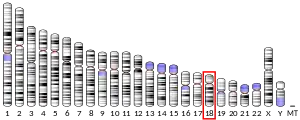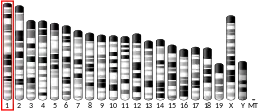| SERPINB10 | |||||||||||||||||||||||||||||||||||||||||||||||||||
|---|---|---|---|---|---|---|---|---|---|---|---|---|---|---|---|---|---|---|---|---|---|---|---|---|---|---|---|---|---|---|---|---|---|---|---|---|---|---|---|---|---|---|---|---|---|---|---|---|---|---|---|
| Identifiers | |||||||||||||||||||||||||||||||||||||||||||||||||||
| Aliases | SERPINB10, PI-10, PI10, serpin family B member 10 | ||||||||||||||||||||||||||||||||||||||||||||||||||
| External IDs | OMIM: 602058 MGI: 2138648 HomoloGene: 68430 GeneCards: SERPINB10 | ||||||||||||||||||||||||||||||||||||||||||||||||||
| |||||||||||||||||||||||||||||||||||||||||||||||||||
| |||||||||||||||||||||||||||||||||||||||||||||||||||
| |||||||||||||||||||||||||||||||||||||||||||||||||||
| |||||||||||||||||||||||||||||||||||||||||||||||||||
| |||||||||||||||||||||||||||||||||||||||||||||||||||
| Wikidata | |||||||||||||||||||||||||||||||||||||||||||||||||||
| |||||||||||||||||||||||||||||||||||||||||||||||||||
Serpin peptidase inhibitor, clade B (ovalbumin), member 10 is a protein that in humans is encoded by the SERPINB10 gene.[5]
Function
The superfamily of high molecular weight serine proteinase inhibitors (serpins) regulate a diverse set of intracellular and extracellular processes such as complement activation, fibrinolysis, coagulation, cellular differentiation, tumor suppression, apoptosis, and cell migration. Serpins are characterized by a well-conserved tertiary structure that consists of 3 beta sheets and 8 or 9 alpha helices.[6] A critical portion of the molecule, the reactive center loop connects beta sheets A and C. Protease inhibitor-10 (PI10; SERPINB10) is a member of the ov-serpin subfamily, which, relative to the archetypal serpin PI1, is characterized by a high degree of homology to chicken ovalbumin, lack of N- and C-terminal extensions, absence of a signal peptide, and a serine rather than an asparagine residue at the penultimate position.[7]
References
- 1 2 3 GRCh38: Ensembl release 89: ENSG00000242550 - Ensembl, May 2017
- 1 2 3 GRCm38: Ensembl release 89: ENSMUSG00000092572 - Ensembl, May 2017
- ↑ "Human PubMed Reference:". National Center for Biotechnology Information, U.S. National Library of Medicine.
- ↑ "Mouse PubMed Reference:". National Center for Biotechnology Information, U.S. National Library of Medicine.
- ↑ "Entrez Gene: Serpin peptidase inhibitor, clade B (ovalbumin), member 10".
- ↑ Huber R, Carrell RW (November 1989). "Implications of the three-dimensional structure of alpha 1-antitrypsin for structure and function of serpins". Biochemistry. 28 (23): 8951–66. doi:10.1021/bi00449a001. PMID 2690952.
- ↑
- Bartuski AJ, Kamachi Y, Schick C, Overhauser J, Silverman GA (August 1997). "Cytoplasmic antiproteinase 2 (PI8) and bomapin (PI10) map to the serpin cluster at 18q21.3". Genomics. 43 (3): 321–8. doi:10.1006/geno.1997.4827. PMID 9268635.
Further reading
- Chuang TL, Schleef RR (April 1999). "Identification of a nuclear targeting domain in the insertion between helices C and D in protease inhibitor-10". The Journal of Biological Chemistry. 274 (16): 11194–8. doi:10.1074/jbc.274.16.11194. PMID 10196205.
- Lindskog C, Korsgren O, Pontén F, Eriksson JW, Johansson L, Danielsson A (May 2012). "Novel pancreatic beta cell-specific proteins: antibody-based proteomics for identification of new biomarker candidates". Journal of Proteomics. 75 (9): 2611–20. doi:10.1016/j.jprot.2012.03.008. PMID 22465717.
- Schleef RR, Chuang TL (August 2000). "Protease inhibitor 10 inhibits tumor necrosis factor alpha -induced cell death. Evidence for the formation of intracellular high M(r) protease inhibitor 10-containing complexes". The Journal of Biological Chemistry. 275 (34): 26385–9. doi:10.1074/jbc.C000389200. PMID 10871600.
- Przygodzka P, Ramstedt B, Tengel T, Larsson G, Wilczynska M (April 2010). "Bomapin is a redox-sensitive nuclear serpin that affects responsiveness of myeloid progenitor cells to growth environment". BMC Cell Biology. 11: 30. doi:10.1186/1471-2121-11-30. PMC 2874763. PMID 20433722.
- Shioji G, Ezura Y, Nakajima T, Ohgaki K, Fujiwara H, Kubota Y, Ichikawa T, Inoue K, Shuin T, Habuchi T, Ogawa O, Nishimura T, Emi M (2005). "Nucleotide variations in genes encoding plasminogen activator inhibitor-2 and serine proteinase inhibitor B10 associated with prostate cancer". Journal of Human Genetics. 50 (10): 507–15. doi:10.1007/s10038-005-0285-1. PMID 16172807.
- Riewald M, Schleef RR (November 1995). "Molecular cloning of bomapin (protease inhibitor 10), a novel human serpin that is expressed specifically in the bone marrow". The Journal of Biological Chemistry. 270 (45): 26754–7. doi:10.1074/jbc.270.45.26754. PMID 7592909.
This article incorporates text from the United States National Library of Medicine, which is in the public domain.



